IoT in Logistics: Applications, Benefits, and Offshore Opportunities for Singapore Businesses (2025 Guide)
The Internet of Things in logistic is reshaping Singapore’s industry by connecting fleets, warehouses, and assets through real-time data. From route optimization and smart warehousing to cold chain monitoring and predictive maintenance, IoT enables operators to make faster, data-driven decisions that boost efficiency, safety, and sustainability.
As Singapore advances its Smart Nation and Industry 4.0 goals, firms are under pressure to digitalize quickly. Yet building IoT systems demands specialized expertise in hardware, connectivity, and cloud analytics. To accelerate innovation, many are turning to offshore IoT development partners in nearby tech hubs such as Vietnam.
In this article, we explore the applications, benefits, challenges, and offshore opportunities of IoT in logistics — and how Kaopiz helps Singapore businesses lead this transformation.
Table of Contents
- What Is IoT in Logistics?
- How Big Is the IoT Logistics Market? (Singapore & Global)
- Key Applications of IoT in Logistics and Supply Chain
- What Are the Benefits of IoT in Logistics for Singapore Businesses?
- What Are the Main Challenges of Implementing IoT in Logistics?
- Why Are Singapore Businesses Turning to Offshore IoT Development Partners?
- How to Choose the Right Offshore IoT Logistics Partner
- Kaopiz – Your Trusted Partner for Custom IoT Logistics Development
- The Future of IoT in Logistics (2025–2030)
- Conclusion
- FAQs
What Is IoT in Logistics?
IoT in logistics refers to the use of connected sensors, devices, and systems that collect and share real-time data across the supply chain. These technologies enable logistics teams to track fleets, monitor shipments, and optimize routes with greater accuracy and efficiency.
By connecting physical assets to digital platforms, IoT gives companies full visibility and control over operations — reducing costs, delays, and losses. For Singapore businesses, IoT is the foundation of smart, data-driven supply chains that deliver faster, safer, and more sustainable results.
How Big Is the IoT Logistics Market? (Singapore & Global)
The IoT in logistics market is expanding rapidly worldwide as supply chains embrace automation, connectivity, and data-driven decision-making. According to Mordor Intelligence, the market is valued at USD 59.32 billion in 2025 and is forecast to reach USD 102.42 billion by 2030, advancing at a compound annual growth rate (CAGR) of 11.54%. This growth reflects the global push toward smart infrastructure, predictive analytics, and sustainability in logistics operations.
In Singapore, IoT powered logistics market— a core contributor to national competitiveness — is undergoing a similar transformation. The freight and logistics market is estimated at USD 24.53 billion in 2025, expected to reach USD 33.33 billion by 2030, at a CAGR of 6.32% during the forecast period (2025–2030). Supported by initiatives like Smart Nation, Industry 4.0, and strong regional trade connectivity, Singapore is positioning itself as a leading IoT-driven logistics hub in Asia.
Key Applications of IoT in Logistics and Supply Chain
IoT technologies are reshaping every stage of logistics — from fleet management to warehouse operations and last-mile delivery. Below are the key applications of IoT in logistics today.
Real-Time Fleet Tracking and Route Optimization
IoT sensors and GPS devices allow managers to monitor vehicle locations, fuel consumption, driver behavior, and delivery progress in real time. Through cloud dashboards and AI in logistics, companies can optimize routes to reduce idle time, avoid traffic congestion, and improve on-time delivery performance.
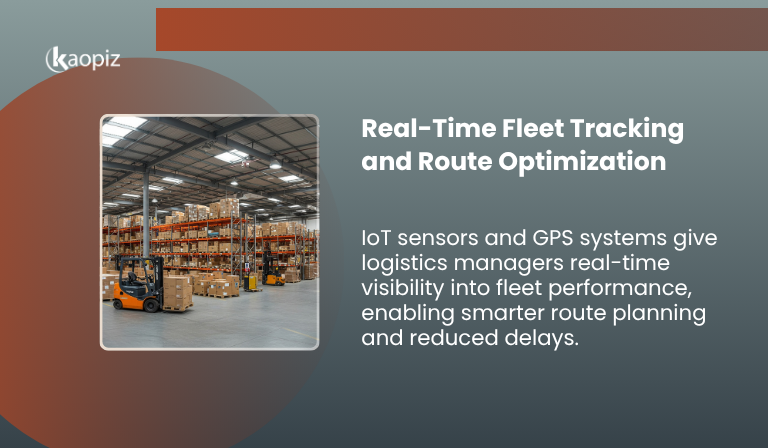
For Singapore firms managing regional operations across Southeast Asia, IoT-powered fleet tracking helps ensure visibility, compliance, and cost efficiency — particularly in cross-border logistics and port operations.
Smart Warehousing and Inventory Management
In modern warehouses, IoT sensors, RFID tags, and automated guided vehicles (AGVs) work together to track inventory movement, monitor stock levels, and identify inefficiencies. Smart shelves and temperature sensors provide real-time insights into storage conditions, helping prevent spoilage and improve warehouse utilization.
This application of IoT in logistics minimizes manual counting errors, shortens picking times, and ensures accurate order fulfillment — critical for Singapore’s high-volume e-commerce and third-party logistics (3PL) sectors.
Cold Chain Monitoring for Perishable Goods
For industries such as food, pharmaceuticals, and healthcare, maintaining temperature and humidity control is essential. IoT devices continuously monitor shipment conditions, sending instant alerts if thresholds are breached.
This ensures compliance with regulatory standards and reduces spoilage or loss during transit. In Singapore’s export-driven market, IoT-based cold chain systems help logistics providers maintain product integrity and customer trust across regional supply networks.
Predictive Maintenance for Transport Assets
IoT sensors embedded in vehicles and machinery track performance indicators such as vibration, temperature, and engine health. By analyzing this data, companies can predict when maintenance is required — avoiding unexpected breakdowns and extending asset lifespan.
Predictive maintenance not only reduces repair costs but also improves fleet reliability and safety, ensuring uninterrupted logistics operations across Singapore’s dense transport network.
Automated Freight and Asset Management
IoT integration allows logistics providers to automate asset tracking and freight handling. Smart tags and sensors help locate containers, pallets, and cargo units throughout the supply chain. Combined with data analytics, businesses can verify cargo status, detect theft or damage, and streamline customs clearance.
In Singapore’s port and aviation hubs, IoT-driven asset management supports faster turnaround times, lower losses, and greater transparency for both operators and clients.
Last-Mile Delivery Optimization
The final leg of delivery is often the most complex and costly. IoT enhances last-mile logistics by integrating location data, real-time traffic updates, and smart delivery scheduling. Connected devices track parcel movements, while mobile apps provide customers with accurate ETAs and proof of delivery.
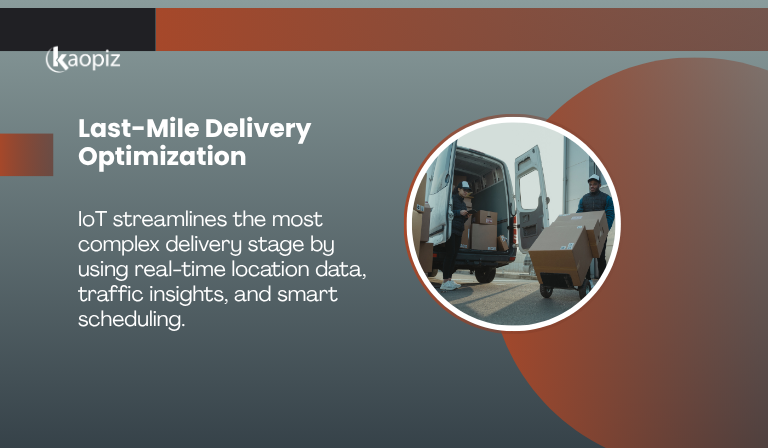
For IoT in supply chain examples in Singapore, IoT-powered last-mile systems improve customer satisfaction, delivery speed, and operational scalability — key to staying ahead in e-commerce and B2B services.
What Are the Benefits of IoT in Logistics for Singapore Businesses?
Adopting IoT for logistics allows Singapore businesses to enhance efficiency, visibility, and customer experience while reducing operational costs. Below are the key benefits of IoT in transportation and logistics sectors.
- Real-Time Visibility and Control: IoT provides continuous tracking of fleets, shipments, and warehouse assets. Managers gain instant access to critical data, enabling quick responses to delays, theft, or route deviations.
- Higher Operational Efficiency: Connected systems automate manual workflows, optimize resource usage, and coordinate teams across transport and storage. The result: reduced idle time, fuel savings, and faster delivery cycles.
- Predictive Maintenance and Cost Savings: IoT sensors monitor the condition of vehicles and machinery to detect issues early. Preventive maintenance reduces downtime and extends asset lifespan, ensuring smoother operations.
- Improved Safety and Regulatory Compliance: Real-time monitoring enhances driver and cargo safety while ensuring adherence to Singapore’s logistics and environmental standards. Alerts help prevent temperature breaches or unsafe driving conditions.
- Enhanced Customer Experience: IoT enables ccurate delivery tracking and live notifications, improving reliability and transparency. For Singapore’s highly competitive market, this builds stronger trust and client loyalty.
- Data-Driven Insights for Strategic Planning: IoT devices generate vast amounts of data. This data supports forecasting, performance tracking, and process optimization. It helps leaders make smarter and faster business decisions.
What Are the Main Challenges of Implementing IoT in Logistics?
While the use of IoT in logistics brings clear advantages, many businesses in Singapore face practical and technical challenges when deploying and scaling solutions. Understanding these challenges of IoT in logistics is key to building a sustainable digital transformation roadmap.
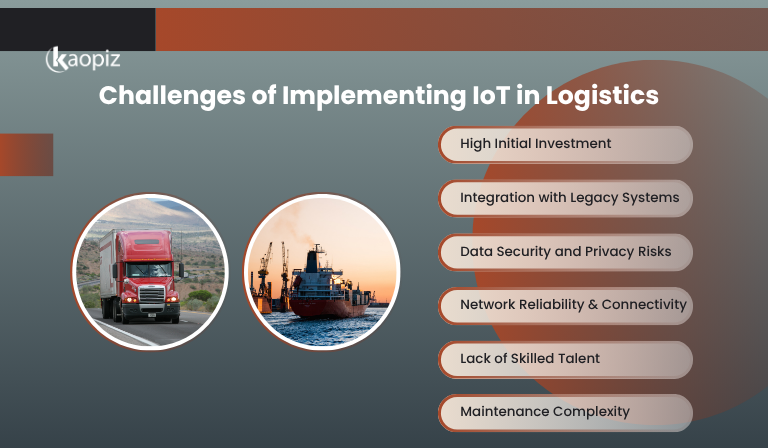
- High Initial Investment: Implementing IoT infrastructure — including sensors, gateways, and cloud systems — requires significant upfront costs. For SMEs, balancing ROI with long-term value can be difficult without a clear strategy.
- Integration with Legacy Systems: Many logistics companies still rely on outdated ERP or tracking systems. Integrating IoT solutions into these environments can be complex, requiring custom APIs, middleware, and skilled development teams.
- Data Security and Privacy Risks: With large volumes of data exchanged between connected devices, cybersecurity becomes a major concern. Ensuring compliance with PDPA and global data protection standards is essential to maintain trust.
- Network Reliability and Connectivity: Continuous IoT data transmission depends on stable connectivity — especially critical for cross-border or remote operations. Interruptions in 4G/5G or satellite coverage can affect system performance.
- Lack of Skilled Talent: Building and maintaining IoT systems demand expertise in embedded programming, cloud computing, and AI analytics — skill sets that are often scarce or expensive in Singapore’s talent market.
- Scalability and Maintenance Complexity: As IoT deployments grow, managing thousands of connected devices becomes increasingly complex. Regular updates, firmware patches, and performance monitoring require dedicated technical support.
Many Singapore firms overcome these challenges by partnering with offshore experts like Kaopiz. These partners offer strong technical expertise and cost-efficient solutions for sustainable implementation.
Why Are Singapore Businesses Turning to Offshore IoT Development Partners?
As IoT adoption accelerates, many companies in Singapore face resource constraints that limit their ability to build and scale connected systems in-house. Offshore software development has emerged as a strategic solution — combining cost efficiency, speed, and access to specialized talent.
- Access to Specialized Expertise: Offshore teams bring deep experience in IoT hardware integration, cloud connectivity, AI analytics, and embedded software — skill sets that are often scarce and expensive to hire locally in Singapore.
- Cost-Effective Development and Maintenance: Partnering with offshore firms, especially in nearby tech hubs like Vietnam, helps companies reduce labor and infrastructure costs without compromising quality. This allows Singapore businesses to allocate more budget toward innovation and scaling.
- Faster Time-to-Market: With dedicated offshore teams, logistics firms can accelerate IoT solution development — from prototyping and testing to deployment — enabling faster rollout of new services and technologies.
- Scalable and Flexible Team Models: Offshore partners provide flexible engagement models such as staff augmentation or dedicated development teams, allowing companies to scale resources up or down based on project needs.
- Focus on Core Business Operations: Outsourcing IoT development enables logistics leaders to concentrate on their primary operations — transportation, fulfillment, and customer service — while their technology partner manages the technical complexity.
- Regional Proximity and Strong Collaboration: For Singapore companies, partnering with ASEAN-based offshore providers ensures minimal time-zone differences, cultural alignment, and smoother communication, making collaboration both efficient and cost-effective.
By working with IoT logistics companies in Singapore, businesses can bridge the technical talent gap, reduce development risks, and accelerate their digital transformation with confidence.
How to Choose the Right Offshore IoT Logistics Partner
Selecting the right offshore IoT development partner is critical to the success of any digital logistics initiative. Beyond cost, the right partner must bring the technical expertise, communication transparency, and long-term reliability needed to deliver secure, scalable IoT systems.
- Proven Expertise in IoT and Logistics: Choose a partner with hands-on experience in IoT platforms, data analytics, and logistics automation. Review their past projects to ensure they’ve built connected systems for fleet tracking, warehousing, or supply chain management.
- Strong Technical Capabilities: The partner should demonstrate full-stack capabilities — from hardware integration and embedded systems to cloud, AI in supply chain, and data visualization. Certifications such as ISO 27001 and AWS Partner status reflect technical maturity and trustworthiness.
- Scalable and Flexible Engagement Models: Look for a company offering flexible engagement options such as dedicated teams, staff augmentation, or end-to-end project delivery. This flexibility allows you to adapt resources as project demands evolve.
- Data Security and Compliance Awareness: Ensure the offshore partner adheres to strict data protection policies and understands local regulations such as Singapore’s PDPA. Security-by-design should be embedded throughout development.
- Effective Communication and Project Management: Smooth collaboration depends on clear communication channels, agile processes, and regular reporting. Select a partner with English-proficient teams, overlapping work hours, and transparent workflows for progress tracking.
- Cultural and Regional Compatibility: Proximity and cultural alignment enhance productivity. IT outsourcing partners in Vietnam and neighboring ASEAN markets share similar business ethics and working hours, making coordination easier for Singapore firms.
A reliable partner not only builds the technology but also helps align it with your business strategy.
Kaopiz – Your Trusted Partner for Custom IoT Logistics Development
With more than 11 years of experience and a team of 700+ skilled engineers, Kaopiz is an offshore software development partner for businesses across Singapore and the Asia-Pacific region. We specialize in building custom IoT logistics solutions that connect data, devices, and operations into a single intelligent ecosystem — helping companies boost efficiency, visibility, and scalability.
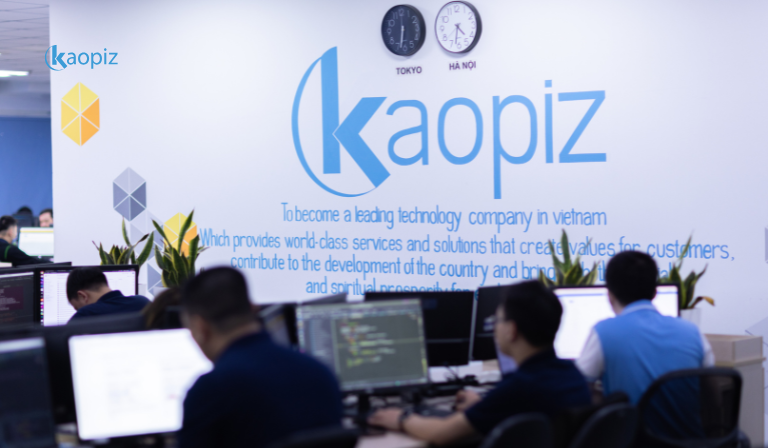
Kaopiz is an ISO 27001 and ISO 9001 certified company and an AWS Advanced Consulting Partner. We ensure every solution meets the highest standards of security, performance, and reliability. Our team has deep expertise in embedded systems, cloud architecture, AI analytics, and automation. We build end-to-end IoT platforms for logistics operations — from fleet management and warehousing to predictive maintenance and last-mile delivery.
Why Partner with Kaopiz?
- Proven Experience: 1,000+ successful projects across logistics, manufacturing, healthcare, and supply chain industries.
- Global Reach, Local Insight: Strong presence in Singapore, Japan, and Vietnam, with deep understanding of local compliance standards such as PDPA.
- Flexible Engagement Models: Choose between dedicated teams, staff augmentation, or full-cycle development — designed for scalability and cost efficiency.
- Fast, Transparent Delivery: Agile processes, clear communication, and quick onboarding — ensuring projects move from concept to deployment with minimal friction.
- Long-Term Partnership Focus: We go beyond coding — offering ongoing support, system upgrades, and data-driven enhancements to keep your IoT logistics operations future-ready.
Whether you’re looking to modernize your existing logistics system or build a new IoT-powered platform from scratch, Kaopiz helps Singapore businesses turn innovation into measurable value — securely, efficiently, and affordably.
The Future of IoT in Logistics (2025–2030)
Between 2025 and 2030, IoT will continue to redefine global and Singapore logistics ecosystems. As 5G, AI, and edge computing mature, logistics networks will become more predictive, autonomous, and sustainable.
- AI-Driven Decision Making: IoT data will feed directly into AI systems for demand forecasting, route optimization, and dynamic inventory management — enabling near-zero downtime operations.
- Integration with Blockchain and Digital Twins: Combining IoT with blockchain will enhance traceability and trust in supply chains, while digital twins will allow logistics companies to simulate and optimize real-world operations in virtual environments.
- Rise of Autonomous Logistics Systems: Connected drones, AGVs (automated guided vehicles), and driverless delivery fleets will become more common, powered by IoT sensors and real-time communication.
- Focus on Green and Sustainable Logistics: IoT will play a major role in energy efficiency and carbon reduction by monitoring fuel usage, optimizing routes, and supporting sustainability reporting.
- Stronger Regional Collaboration: For Singapore, IoT adoption will strengthen its position as a smart logistics hub in Southeast Asia, enabling deeper collaboration with regional partners through connected trade networks and data-sharing ecosystems.
Looking ahead, IoT will evolve from a supporting technology to a core enabler of intelligent logistics, helping businesses in Singapore stay competitive, resilient, and future-ready.
Conclusion
IoT is transforming logistics in Singapore by connecting fleets, warehouses, and supply chains into intelligent, data-driven networks. The result — greater visibility, efficiency, and sustainability.
However, success with IoT requires strong technical expertise and reliable execution. By partnering with offshore IoT development experts like Kaopiz, Singapore businesses can accelerate innovation, reduce costs, and deploy secure, scalable logistics solutions built for the future.
FAQs
- How Can IoT Improve Logistics Operations for Singapore Businesses?
- IoT enhances logistics by providing real-time visibility into fleets, inventory, and shipments. Businesses can optimize routes, prevent delays, and monitor goods in transit, leading to higher efficiency, lower costs, and improved customer satisfaction.
- What Are the Challenges of Implementing IoT in Logistics?
- Key challenges include high initial costs, system integration issues, data security risks, and a shortage of skilled IoT talent. Many companies in Singapore overcome these barriers by partnering with offshore development experts for scalable, secure solutions.
- Why Should Singapore Logistics Companies Consider Offshore IoT Development Partners?
- Offshore partnerships offer cost efficiency, specialized expertise, and faster development cycles. They help firms adopt IoT technologies without the need for large in-house teams or infrastructure investments.
- How Can Offshore Partners Help Singapore Companies Build IoT Logistics Systems?
- Offshore development teams design and implement custom IoT platforms — from sensor integration and cloud connectivity to analytics dashboards and predictive maintenance tools — tailored to each business’s operational needs.
- What Makes Kaopiz a Reliable IoT Development Partner for Logistics Businesses?
- With over 11 years of experience, 700+ engineers, and ISO 27001 / AWS Advanced Consulting Partner credentials, Kaopiz delivers secure, scalable, and cost-effective IoT logistics solutions. The company’s strong presence in Singapore and Vietnam ensures seamless collaboration and regional expertise.
Trending Post
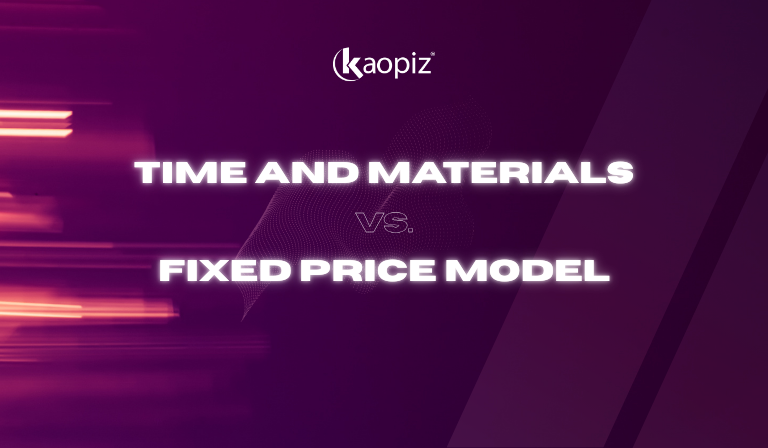
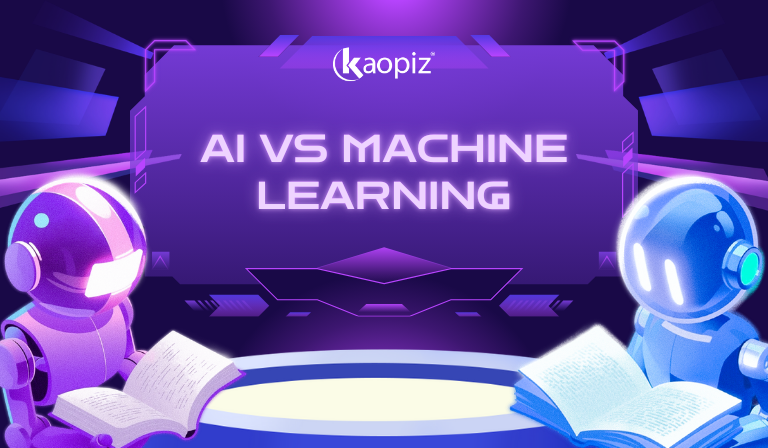
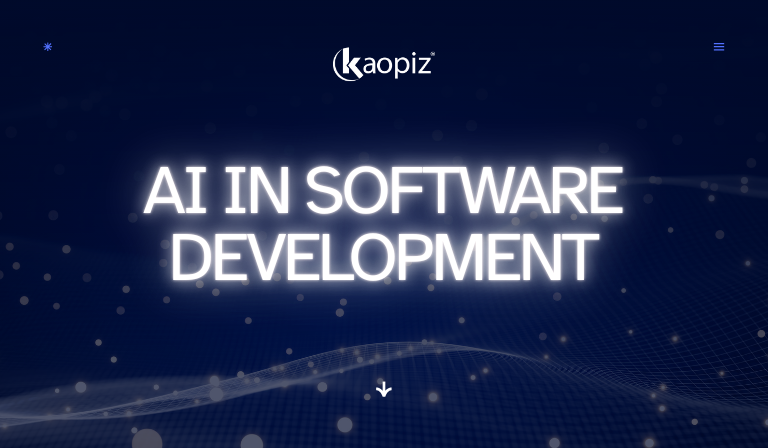


















No Comments yet!